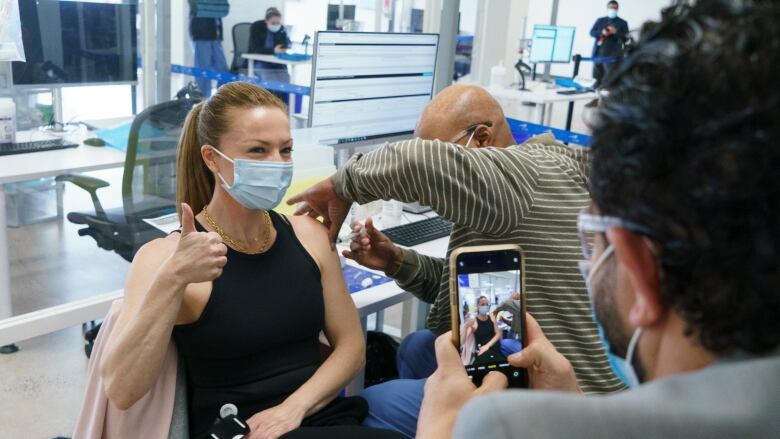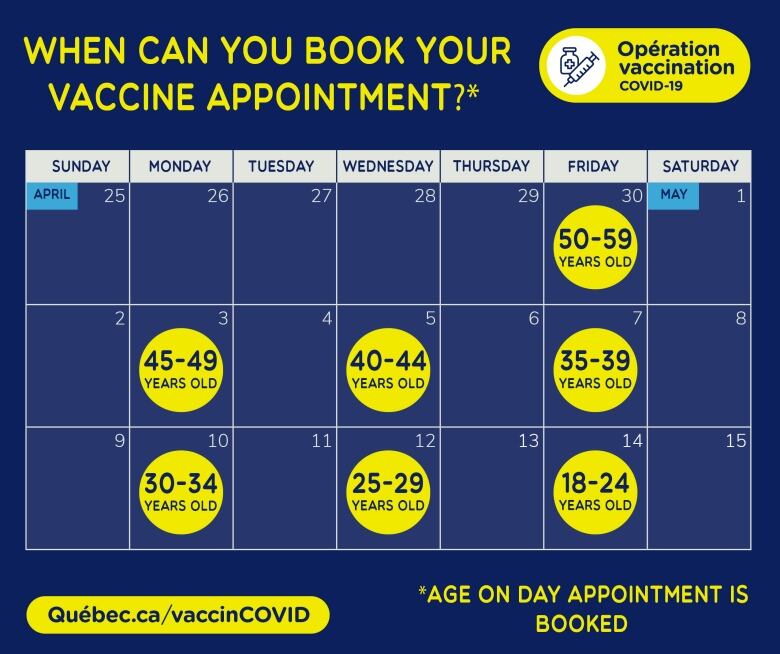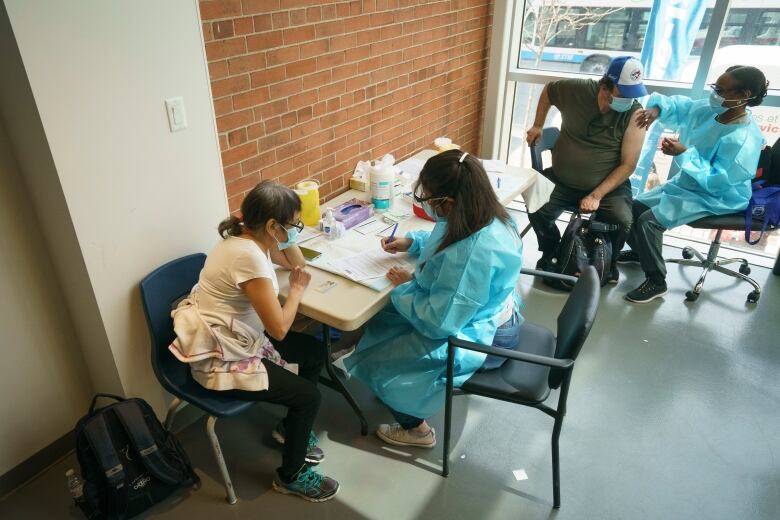Timeline for easing restrictions in Quebec becomes clearer as vaccination effort expands
But removing public health measures will have to be done slowly and delicately, say experts

It's the question everyone has been asking for more than a year now: When will things go back to normal?
The answers often involved hypotheticals, wishful thinking and hope-crushing reality.
But over the next two-and-a-half weeks, every adult in Quebec will be able to book an appointment to get a dose of a COVID-19 vaccine.
So, for perhaps the first time, public health officials and experts can begin sketching an answer that involves firmer timelines and more realistic scenarios.
Removing the pandemic restrictions, they say, will nevertheless have to be done delicately and slowly. The margin of error is small, with highly infectious variants on the prowl.
"We're working on a plan [for lifting measures] but we still have to remain cautious," Health Minister Christian Dub said Thursday, announcing the launch of the mass vaccination campaign.
Dr. Theresa Tam, Canada's chief public health officer, said recently that the most restrictive measures could be lifted gradually once vaccination campaigns cross a threshold.

Citing modelling done by her department, Tam said the threshold would be crossed when 75 per cent of the adult population is partially vaccinated, and 20 per cent is fully vaccinated.
"These models give us hope, illustrating that there is a safe way to lift most restrictive public health measures, like certain workplace and business closures, by this summer, if enough people get vaccinated," Tam said.
Quebec expects to see 75 per cent of its adult population partially vaccinated by June 24.
Revised timelines
But don't start circling party dates on the calendar just yet. Public health officials will also have to factor in the lag time for immunity to develop and infection cycles to expire, said Dr. Matthew Oughton, an infectious diseases specialist at Montreal's Jewish General Hospital.
"Before you allow relaxation of precautions, you have to allow sufficient time for people to a) get vaccinated and then b) for their immune response to vaccination," said Oughton, who is also an assistant professor at McGill University.
It takes roughly two weeks for people to develop protection after receiving a vaccine dose, and three weeks for virus transmission chains to be interrupted.
That means the earliest Quebec could consider lifting some restrictions is toward the middle or end of June, Oughton said.
On Thursday, QuebecPublic Health DirectorDr. Horacio Arrudacautioned there was "no magic number" of vaccinations at which point measures could be loosened safely.
He said his recommendations to the government would be based on a number of other factors as well, including infection rates, ongoing outbreaks and vaccine coverage.
"There are so many unknowns and unthinkables that we can't control," Arruda said.
Don't forget the second dose
And even with case numbers and hospitalizations declining at the moment, the consensus among experts is that it is still too soon to begin the process of lifting restrictions.
Models released Thursday by Quebec's public health institute, the INSPQ, projected those trends would continue as the mass vaccination effort gathers momentum.
WATCH | Quebec expands its vaccination program to anyone over 18
But Marc Brisson, aUniversit Laval modelling expert with the INSPQ, said public health measures are still necessary in the interim to avoid a surge in cases.
"For these more optimistic projections to actually happen, there has to be a high level of coverage and at the same time a good adherence to the public health measures," Brisson said.
There is also a danger that the public overestimates what social activities are safe after only one dose of the vaccine. That would be a recipe for undoing much of the progress made in recent weeks, said epidemiologist Prativa Baral.
"Just because more and more people are getting vaccinated doesn't mean we can start having indoor gatherings; it doesn't mean we can let go of our masks, yet," said Baral, who is also a doctoral candidate at the Johns Hopkins Bloomberg School of Public Health in Maryland.

Oughton expects Quebec will take a similar approach to the U.S.Centersfor Disease Control and release guidelines around masking and social interactions once enough members of the public have had one or two doses.
Critics have pointed out that Canadian governments have not yet done so despite vaccination campaigns being underway since the winter, but Oughton notes the U.S. is well ahead of Canada in its efforts.
"One of the differences that separates, generally speaking, Canada from the States is that in Canada, we've done a lot more of this delayed second dose," Oughton said.
The protection offered by the first dose of a vaccine wanes over time. Quebec has seen small-scale outbreaks at long-term care homes and, more recently, a hospital, where staff were waiting for the second dose.
"If you want to avoid ... seeing that story play out overand over again, you would be well advised to be very careful in a relaxation of measures because partial vaccination may not be exactly the same as full vaccination," Oughton said.














_(720p).jpg)


 OFFICIAL HD MUSIC VIDEO.jpg)
.jpg)



























































































